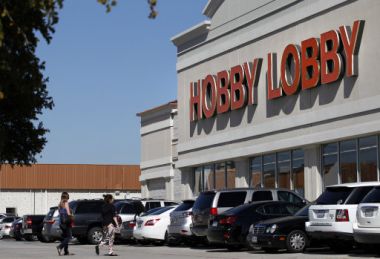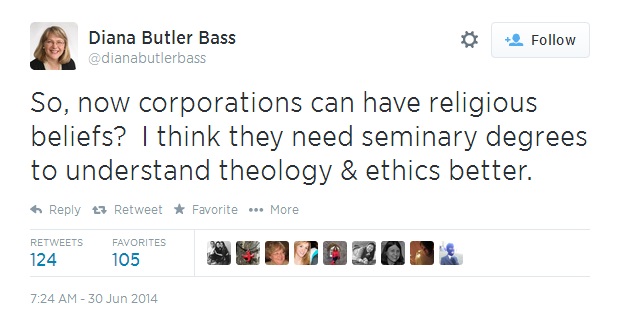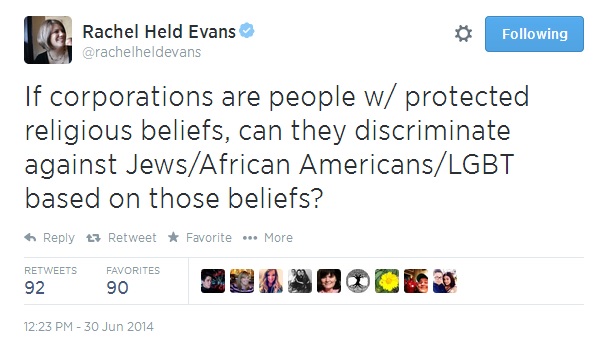Hobby Lobby and the morning after pill: a victory for religious liberty?

The Supreme Court yesterday ruled in favour of Hobby Lobby's Christian owners who refused to offer employees morning after and week after pills as part of the company's health insurance plans.
In a landmark decision, justices ruled by a 5-4 majority that closely-held businesses can uphold religious objections which allow them to opt out of contraceptive health law requirements as set out in Obamacare legislation.
A committed evangelical Christian, owner David Green has willingly provided other contraceptives under his healthcare plan, but has refused to be complicit in what his family sees as potential 'abortion-causing' (ie the morning after and week after pills). In doing so, he has risked fines of up to $1.3 million a day – $100 per employee.
"These abortion-causing drugs go against our faith, and our family is now being forced to choose between following the laws of the land that we love or maintaining the religious beliefs that have made our business successful and have supported our family and thousands of our employees and their families," Green announced in a statement last year.
"We simply cannot abandon our religious beliefs to comply with this mandate."
Yesterday's verdict has thus been met with delight from the Green family and their supporters. Barbara Green, who co-founded Hobby Lobby with her husband, released a statement saying: "Our family is overjoyed by the Supreme Court's decision".
"Today the nation's highest court has re-affirmed the vital importance of religious liberty as one of our country's founding principles," she continued.
"The Court's decision is a victory, not just for our family business, but for all who seek to live out their faith. We are grateful to God and to those who have supported us on this difficult journey."
FirstThings.com labelled yesterday's move "Good news", adding: "The decision in the Hobby Lobby case helps prevent progressives from achieving their goal of making religious people into 'dhimmis', second-class citizens in a society governed by secular values.
"This is a very good outcome. Without it religious entrepreneurs would be vulnerable to intolerable pressures," it notes.
However, the majority vote has received much derision for its treatment of a corporation as having a unified religious belief. Many have suggested that the Court has offered businesses rights, while denying them to women, and some have expressed concern about the wider implications of the verdict with regards to other vulnerable groups.



Justice Ruth Bader Ginsburg, who dissented on the case, argued that offering businesses exemption from certain clauses of Obamacare would "deny legions of women who do not hold their employers' beliefs access to contraceptive coverage".
"Religious organizations exist to foster the interests of persons subscribing to the same religious faith. Not so of for-profit corporations," she added.
"Workers who sustain the operations of those corporations commonly are not drawn from one religious community...Approving some religious claims while deeming others unworthy of accommodation could be perceived as favouring one religion over another.
"The court, I fear, has ventured into a minefield," she concluded.
In an article for Christianity Today Magazine, however, author and pastor Ed Stetzer, contends that the Hobby Lobby case was always centred on religious liberty, and as such the outcome was positive for believers across America.
"The U. S. Supreme Court has given the Obama administration (and, hopefully the world) a lesson in religious liberty—the government cannot (and must not) require people of faith to violate their sincerely-held beliefs," he writes.
"The ruling in favor of Hobby Lobby and Conestoga Wood Specialties underscores religious liberty as our 'first freedom'. The freedom to exercise religion, enshrined in our Constitution's Bill of Rights, has been called 'the cornerstone of the American experiment' because it is from our religious freedom all of our other freedoms flow."
The White House has condemned yesterday's ruling, but a spokesperson insisted that the administration would work to protect women's rights going forward.
"Some bosses can now withhold contraceptive care from their health coverage based on their own religious views. Today's decision jeopardises the health of women who are employed by these companies," the spokesman said.
"We will work with Congress to make sure that any women affected by this decision will still have the same coverage of vital health services as everyone else," he added.
Watch the Greens' response below:











